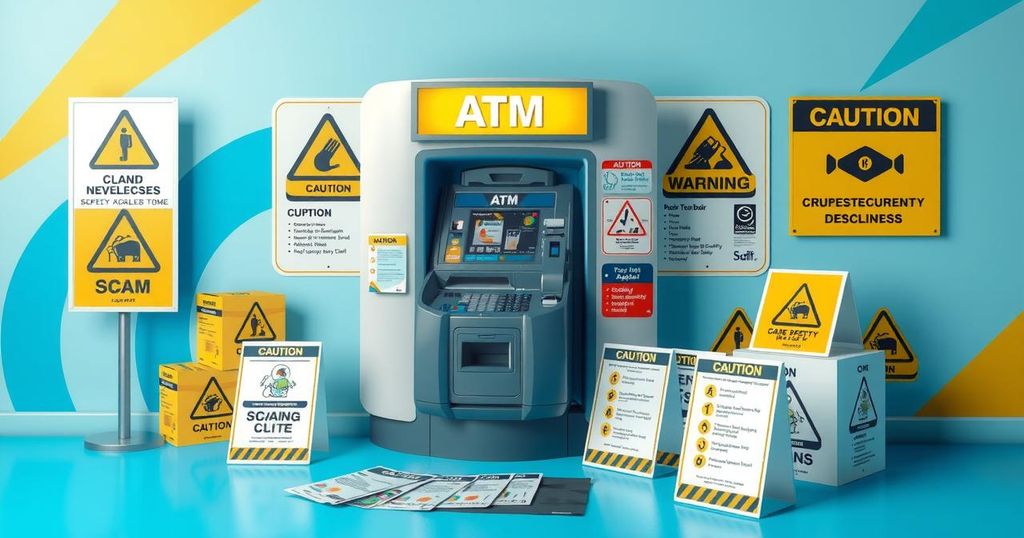Scam alerts!
ACT, AUSTRALIA, BITCOIN MINING, CANADA, CRYPTOCURRENCY, CUBA, CYBERSECURITY, FRAUD, JOINT POLICING CYBERCRIME COORDINATION CENTRE, JPC3, MATTHEW CRAFT, NEW ZEALAND, NORTH AMERICA, NSW, NSW POLICE CYBERCRIME SQUAD, NSW POLICE FORCE, OCEANIA, ONLINE SCAMS, TASMANIA, VICTORIA, WESTERN AUSTRALIA
Elena Garcia
0 Comments
Authorities Crack Down on Misuse of Cryptocurrency ATMs Amid Rising Scams
Cryptocurrency ATMs in Australia have surged to over 1,800 from 23 in 2019, raising concerns about their exploitation by scammers. Police have contacted more than 90 individuals in a nationwide operation targeting misuse. The NSW Police and AUSTRAC are urging the public to report suspicious activities and stay vigilant, especially as many victims, often over 50, are inadvertently involved in scams.
Cryptocurrency ATMs are on the rise in Australia, jumping from a mere 23 machines in 2019 to more than 1,800 now. While these machines can facilitate the conversion of cash into digital currencies, authorities are increasingly worried about their misuse. Police have reached out to over 90 Australians in a nationwide crackdown focused on the criminal exploitation of these ATMs. Organised crime syndicates and fraudsters are said to be using them to exploit victims, leading to serious concerns about security.
The crackdown involves a coordinated operation led by the NSW Police Force, in collaboration with AUSTRAC and the Australia-New Zealand Crypto Practitioners Working Group. This initiative has targeted high-risk ATM users across every state and territory, barring Victoria, while the AFP’s Joint Policing Cybercrime Coordination Centre is also running a national awareness campaign.
Detective Superintendent Matthew Craft from the NSW Police Cybercrime Squad has issued a caution: sending money through crypto ATMs to acquaintances made online is a red flag for scams. “If someone you don’t know asks you to transfer funds via a crypto ATM, it’s likely a scam,” he warned. Numerous victims, tricked by cybercriminals, have deposited large sums, some even hundreds of thousands of dollars, oblivious to their situation until approached by police.
Police have identified multiple victims across various states, with 21 individuals contacted in the ACT, Tasmania, and NSW. Some are suspected to be acting unwittingly as “money mules,” helping to launder criminal proceeds. One man in Western Australia has been charged with property laundering, while four others have received warnings for possible involvement in drug-related activities or money laundering.
It’s estimated that around $275 million is processed through Australian cryptocurrency ATMs annually, with a worrying portion suspected to be linked to scams. In the year leading up to January 2025, there were over 150 reported scams involving these ATMs, totaling losses of more than $3 million.
Moving forward, phase two of the operation is now in effect. Venues that host crypto ATMs are being encouraged to inform users about potential scams and display warning materials. AUSTRAC and JPC3 are distributing informative leaflets detailing red flags for fraud and guidance on seeking help.
New data reveals that over 70% of the transaction value at crypto ATMs comes from users aged over 50, who are particularly at risk for romance and investment scams. AFP Commander Graeme Marshall stressed that scammers are taking advantage of the anonymity offered by these ATMs, turning them into tools for money concealment.
“Victims are being misled by promises of love or quick profits,” he explained. “If someone guarantees fast returns or pushes you to make quick decisions, you need to pause and report it.” In response to these issues, AUSTRAC has introduced regulations like a cap on transactions at $5,000, aimed at reducing misuse.
Case investigations have also revealed troubling incidents, such as a man reportedly using crypto ATMs for drug purchases delivered via Australia Post. Following a police tip, the ATM operator barred the user, while Australia Post was notified of the situation. Victoria Police echoed the sentiment for vigilance among the public, advising, “If it seems too good to be true, it probably is,” emphasising that once lost, that money is unlikely to be retrieved.
Authorities are appealing to Australians to stay alert, discuss issues with at-risk family members, and report any dubious activities to ReportCyber.
Support for journalism remains crucial as communities depend on transparent and unbiased reporting. Donations and subscriptions can enhance efforts to keep such vital journalism alive, supporting the integrity of public information.




Post Comment